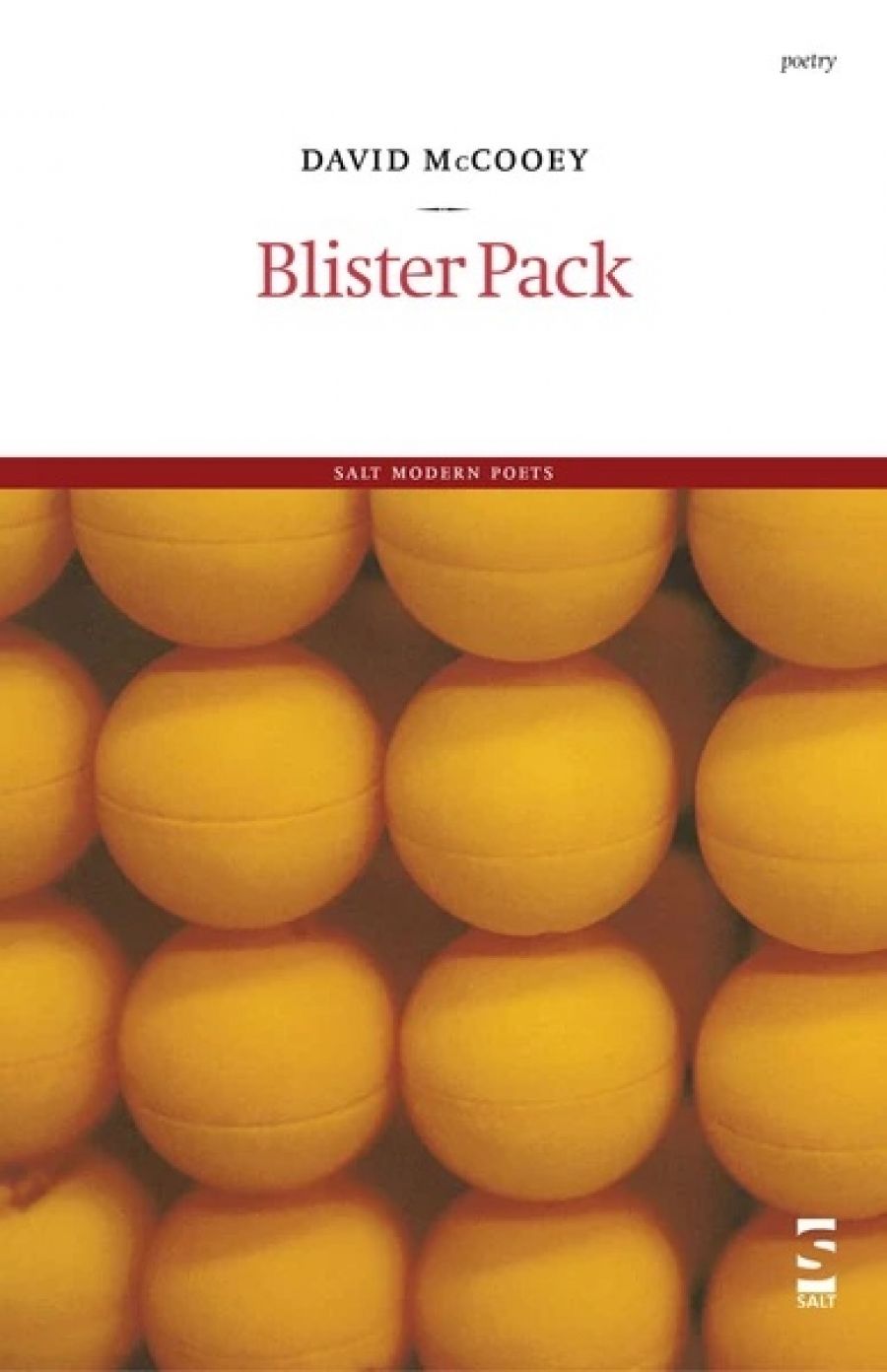
- Free Article: No
- Contents Category: Poetry
- Review Article: Yes
- Online Only: No
- Custom Highlight Text:
If I hesitate to declare delight in Blister Pack, David McCooey’s first volume of poetry, it may be because McCooey himself casts a shadow over the word in ‘Succadaneum’, a sequence of sardonically sad glimpses of the failed love that constitutes the theme of Part II of this collection – ‘Delight, it turns out, / is a lawyer / staying back at work / kicking off her shoes / and opening a bottle of red’, abandoning clients’ disasters to files ‘locked / in metal cabinets’.
- Book 1 Title: Blister Pack
- Book 1 Biblio: Salt Publishing, $29.95 pb, 97 pp, 1 84471 052 1
Emboldened, however, by the celebratory counter-theme of Part IV, where a new love gives the poet ‘those simple things that angels covet’, I’ll stand by my reaction, with a rider that the pleasures of McCooey’s poetry are both simple and complex. They include the witty urbanity of lines such as ‘Rock stars marry in haste and repent in leisure wear’ (‘Singles’), or images of suburbia as a ‘Belgium of the mind’ (‘Occupations’), or the ‘Boarding School’, where ‘The European trees seem real enough / Though one has doubts about the architecture’. Doubt is a capacity underrated in our present ideologically beset condition. To possess an ‘ironic heart’ that insists ‘Perhaps ... perhaps ... perhaps’ (‘A Perfect Heart’) is intelligence, not weakness. And throughout this collection, there is pleasure in seeing a lucidly articulate intelligence at work. It is a readerly pleasure compounded, not negated, by the poet’s recognition of the limits of intelligence, its partial occupation of the domain of experience. The brain must coexist with the heart which ‘has no frontal lobes’, but lives as ‘a blind poet, singing / O, O, O, to the tired, uncomprehending brain, who / cannot remember why or / when the heart made up / its mind not to listen to mind’ (‘A Perfect Heart’).
The eye, too, has its own experience and definition of the world. So, in ‘What Light Is’, ‘The Dictionary / Of National Biography / Stands guard against forget- / fulness and time. / But the day is / Only held still by the / Shifting trees and shifting / Light on my desk’. This is very visual poetry, recalling the poetic manifesto of the Imagist movement in its insistence that what is seen can be reduced to ‘neither picture book nor symbol’. Indeed, some of the short poems, for instance ‘Seen from a Train’, could sit very happily within an Imagist anthology. Like the Imagists, McCooey is not afraid of that sometimes despised ‘figure of speech’, the simile – provided the links made are unpredictable, a way of making ‘unknown junctures’: a car ‘crouches like a cat’ (‘Home Beautiful’), ice ‘cracks in the water, / musical like wind-chimes at night’ (‘Late: Summer: Sydney’).
One of the most immediate pleasures of McCooey’s poetry is its formal elegance, its air of composed sensuousness. ‘Beguiling’ is how Dorothy Porter describes its ‘silky rhythms’. It seems to me, however, that poetic form for McCooey is an analogous mode of corporeality. Form gives the poem a body and, like the human body, it is informed by the mind, the heart and the senses, in varying combinations and permutations, sometimes together, sometimes in conflict, sometimes as if oblivious of each other. Here, McCooey’s readiness to accept simile is important, for he never yields to the poetic hubris of claiming a greater reality for the word as against the world. As for the other position, that the word is an escape from ‘how / things really are’, it is entertained only in regard to the reader in ‘What to Do with the Evenings (II)’. For the writer, the situation is different, and more ambiguous, since the right hand ‘holds the pen as if it / Was a lover. Beyond it is the world.’ (‘His Hands’).
Perhaps, then, what I value most is McCooey’s capacity to evoke the quiddity, the thinginess, of the world at the same time as he knows that there is always something about things, and about words, that ‘keeps evading us’ (‘Days’). One of the most characteristic demonstrations of this quality is ‘Je-ne-sais-quoi’, making it therefore an appropriate closing quotation:
Three a.m. is the time for tragedies
Or parties (sometimes both). But when alone
It is a different kind of time, when Mind
Can glimpse its shadow, and entertain
Those moments of I-know-not-what: the sound
Of bells, or just after; the sight of clouds
Upon the milky page of childhood; the
Nostalgia of trains; and grappling with verbs.


Comments powered by CComment